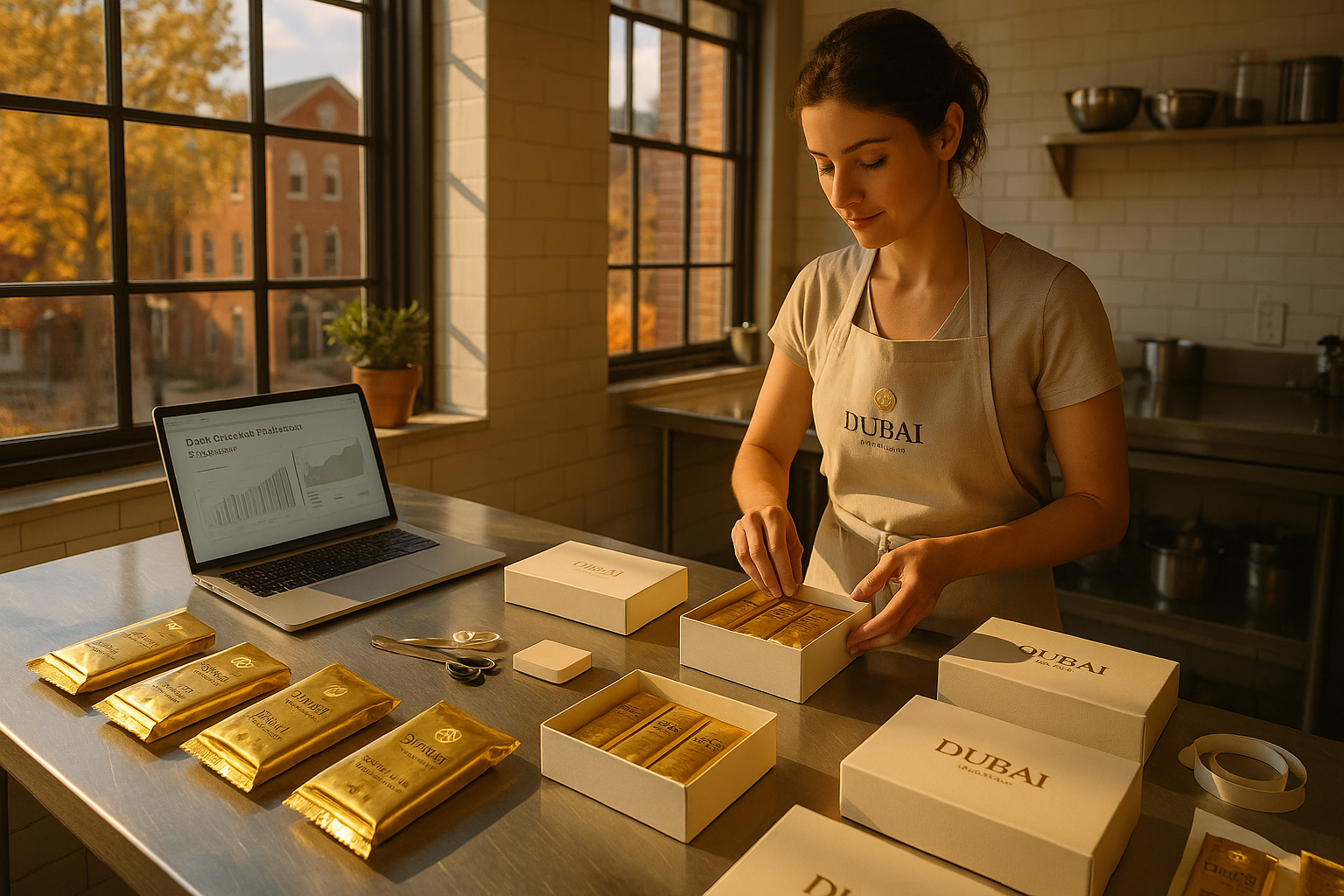Why Start a Food Business in New Hampshire
New Hampshire’s economy is one of the strongest in New England — and its no sales or income tax policy makes it especially attractive for food entrepreneurs. Whether you’re planning to launch a café, bakery, food truck, or packaged product brand, the Granite State offers a combination of low business costs, strong local markets, and favorable food laws.
Cities like Manchester, Portsmouth, Nashua, and Concord are brimming with opportunity for creative food startups. Local consumers value artisan quality, locally made products, and unique culinary experiences.
💡 And if you want to launch your own premium dessert or chocolate brand without starting from scratch, the Dubai Chocolate Startup Package by Uncle Fluffy provides a turnkey solution — complete with tools, branding, and training.
Step 1: Decide What Type of Food Business You Want
Before getting into permits or licenses, identify the format that best fits your goals and investment.
|
Business Type |
Description |
Ideal Investment Range |
|
Home-Based Food (Cottage Food Law) |
Make and sell foods from your home kitchen. |
$1,000–$5,000 |
|
Commercial Kitchen or Food Truck |
Rent or build a small-scale licensed kitchen. |
$5,000–$25,000 |
|
Retail Store, Bakery, or Café |
Full-service food outlet with dine-in or retail. |
$25,000–$100,000+ |
|
Packaged Food Brand |
Sell branded products like chocolate, snacks, or sauces. |
$10,000–$30,000 |
💡 The Dubai Chocolate Startup Package falls into the “Packaged Food Brand” category — perfect for entrepreneurs looking to start small and scale quickly.
Step 2: Register Your Business
All businesses in New Hampshire must be registered through the New Hampshire Secretary of State using the NH QuickStart Portal (https://quickstart.sos.nh.gov).
Steps:
1. Choose your business name.
2. File your LLC or Corporation online ($100 filing fee).
3. Obtain your EIN (Employer Identification Number) from the IRS.
4. Open a business bank account to manage transactions.
💡 An LLC is the best option for most food entrepreneurs since it protects your personal assets.
Step 3: Understand New Hampshire’s Food Laws
New Hampshire is known for its Cottage Food Law, which allows individuals to produce and sell low-risk foods from their homes without a commercial kitchen.
You Can Sell From Home If:
- Your sales stay below $20,000 per year.
- Your products are shelf-stable (e.g., chocolates, baked goods, candies).
- You label all products with ingredients, allergens, and your contact info.
If you exceed those limits, you’ll need to use a licensed commercial kitchen and meet local health regulations.
💡 The Dubai Chocolate Startup Package includes label templates, FDA-compliant nutritional guidelines, and legal setup support.
Step 4: Get Licenses and Permits
Depending on your business type and city, you may need the following:
- Local Health Permit (from the City or County Health Department)
- Food Establishment License (if using a commercial kitchen)
- ServSafe Certification (for food handling and safety)
- Zoning Approval (for storefronts or home-based kitchens)
- Sales Tax License (not required in NH, but needed for interstate sales)
💡 The Dubai Chocolate Startup Package helps streamline compliance by providing labeling, storage, and hygiene training modules.
Step 5: Build Your Menu or Product Line
Your product defines your brand — and the more unique it is, the faster you stand out.
Popular Food Niches in New Hampshire:
- Baked goods & pastries
- Chocolates & confectioneries
- Organic snacks
- Gluten-free or vegan foods
- Specialty beverages (coffee, kombucha, juices)
💡 Dubai Chocolate by Uncle Fluffy combines Middle Eastern flavors like Pistachio & Kunafa with luxury packaging — a concept that fits perfectly in New Hampshire’s artisanal food scene.
Step 6: Set Up Production & Equipment
For most food businesses, efficiency starts with the right equipment.
Essentials for Chocolate or Dessert-Based Businesses:
- Chocolate tempering machine
- Vibrating and cooling trays
- Food-grade mixing tools
- Digital scales and thermometers
- Airtight packaging materials
💡 All of these are included in the Dubai Chocolate Startup Package, along with instructions and supplier lists.
Step 7: Packaging & Branding
In the food industry, presentation sells. Customers often buy with their eyes before their taste buds.
Focus On:
- Premium Packaging: Use foil, sleeves, and elegant branding.
- Labeling Compliance: Include ingredients, allergens, and expiration dates.
- Storytelling: Communicate what makes your product special (e.g., “Dubai-inspired luxury chocolate crafted locally in New Hampshire”).
💡 The Dubai Chocolate Startup Package includes full branding support — logo design, color palette, and marketing materials.
Step 8: Selling and Marketing Your Food Business
To make your business profitable, combine local and digital marketing strategies.
Local Channels
- Farmers’ markets and artisan fairs.
- Partnerships with cafés, hotels, or local boutiques.
- Catering for weddings and corporate events.
Online Channels
- Sell through your own Shopify store (included in the package).
- Offer gift subscriptions or seasonal boxes.
- Promote through TikTok, Instagram, and local food influencers.
💡 Uncle Fluffy’s social media team (3M+ followers) provides co-branding exposure to selected Dubai Chocolate partners.
Step 9: Manage Costs and Scale Profitably
Example Profit Breakdown (Dubai Chocolate Model):
|
Monthly Sales |
Revenue (@$12/bar) |
Cost (@$3/bar) |
Profit |
|
1,000 bars |
$12,000 |
$3,000 |
$9,000 |
|
3,000 bars |
$36,000 |
$9,000 |
$27,000 |
|
10,000 bars |
$120,000 |
$30,000 |
$90,000 |
💡 In New Hampshire, no sales tax means you keep more profit compared to other states.
Step 10: Expand Your Business
Once established, you can scale your food business by:
- Supplying local retailers and cafés.
- Offering private-label production.
- Opening a kiosk or dessert café.
- Exporting through e-commerce.
💡 The Dubai Chocolate Startup Package allows you to expand easily into retail or franchise models once production scales.
FAQs
Q1: Do I need a commercial kitchen to start a food business in New Hampshire?
Not necessarily. Under Cottage Food Law, you can produce low-risk foods like chocolates and baked goods from home.
Q2: How much does it cost to start a small food business?
Anywhere between $2,000 and $50,000. The Dubai Chocolate Startup Package starts at $20,000 and includes everything you need.
Q3: Can I sell online across the U.S.?
Yes, as long as your packaging meets FDA labeling standards — which are included in the package.
Q4: How can I make my food business stand out?
Offer unique, high-end products like Dubai Chocolate, focus on branding, and tell a compelling story.
Q5: How soon can I launch?
With the Dubai Chocolate Startup Package, you can start selling within 30 days of setup.
Schema Markup Suggestions
Article Schema
- Type: BlogPosting
- Author: Alaa Mohra
- Publisher: Uncle Fluffy
- Keywords: how to start a food business in New Hampshire, Dubai Chocolate, Uncle Fluffy, Dubai Chocolate Startup Package, food laws NH, small business NH, dessert business USA
- DatePublished: 2025-10-21
Organization Schema
- Name: Uncle Fluffy
- Logo: https://unclefluffy.com/logo.png
- Founded: 2017
- Headquarters: Dubai, UAE
- Social Links: Instagram, TikTok, Facebook
Product Schema
- Name: Dubai Chocolate Startup Package
- Description: A turnkey food business solution that includes tools, branding, and training to start your own luxury chocolate brand.
- Price: USD 20,000
- Brand: Uncle Fluffy
- Availability: InStock
FAQ Schema
Include all five FAQs listed above.
Start Your Own Dubai Chocolate Business >
We can help you:
We can ship to you everything you need to start your own Dubai Chocolate business in 30 days, a complete business-in-a-box that gives you everything to launch instantly: recipes, equipment, branding, packaging, training, suppliers, and marketing support. It’s a proven viral product tied to Dubai’s prestige, designed to cut risk, save time, and let you own a ready-made business with global appeal.
Contact us now



